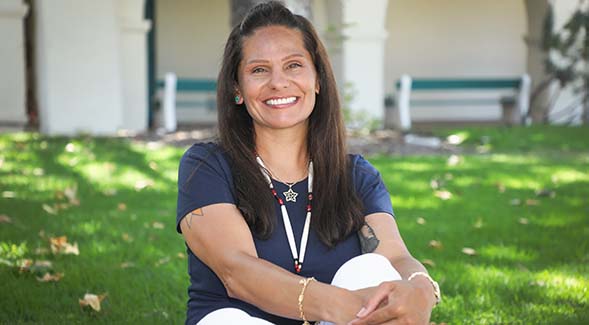CSU Trustees Award Winner is an Agent of Change
Chamese Dempsey is pursuing a graduate degree in social work to address long-standing issues with Native Americans.

“A healing journey for me” — that’s how Chamese Dempsey characterizes her path to the San Diego State University bachelor’s degree in social work she earned last May.
Dempsey will be honored Tuesday by the California State University Board of Trustees with a Trustee Scholars Award for Outstanding Achievement. Her improbable description of the undergraduate experience as a source of wellness speaks to the historical trauma experienced by Dempsey’s fellow Native Americans, as well as personal issues from a difficult childhood.
Now in the SDSU master’s program in social work, Dempsey aims to tackle multiple mental health issues in Indigenous communities, addressing problems stemming from issues of governmental abuse and neglect.
“Being able to break so many cycles of intergenerational trauma is something that I’ve been able to achieve throughout this time,” the first-gen student said in an interview last week. “I feel that it has definitely benefited me because when I am out there in the field working with vulnerable people. I recognize things.”
Dempsey is a single mother of three at what some would consider the crossroads of early adulthood and middle age. Her Stauffer Foundation Scholar award from CSU comes with $8,000 in financial aid for the next academic stage of her journey which includes participation in a Tribal Pilot program to bring Native students into the profession.
Her ultimate goal to obtain her licensure as a clinical social worker in direct practice requires 3,000 hours of supervised work over two or more years.
Dempsey is in an Advanced Standing program which will allow her to finish her studies in a year. Her field placement is a 20-hour-a-week internship in the County of San Diego Child Welfare Services’ emergency response department. She expects to serve in the East County region and eventually Native Communities as part of a continuing reform in addressing the Indian Child Welfare Act of 1978.
It’s important to have Native representatives in such positions because of the communities’ historic lack of trust in government agencies, said Dempsey, whose Indigenous identity is with the Paiute, Yaqui and Ojibwe people.
Families may be more willing to work with someone from a similar background, she said, and being “in the system, understanding it and seeing how the process works” will give her the appropriate lens to be able to help Native families, she said.
“I do see myself representing the Native community in my future and being that person of motivation and support when it comes to healing our people, no matter the age.”
A research project on Native cancer-patient treatment during COVID showed her the Indian health care system “is so flawed,” Dempsey said, burdened by an infrastructure dating to the ‘70s. “There are so many holes.”
Dempsey credits the grandparents who raised her with setting an example for her in community activism and volunteerism. “These are areas I am now a natural in that attribute towards many areas of my success.”
She began developing her professional skills early and has experience in social work at a drug and alcohol treatment center, case management, and in mental health crisis intervention. Much of the work came before she transferred to SDSU from San Diego City College, two decades after her first try at an East County community college.
At SDSU, she balanced a full-time schedule, duties for the university’s Indigenous Social Work Alliance, and induction into three honors societies. She never missed a single class at either City College or SDSU, and she kept an internship appointment on a day when she suffered a concussion from a slip-and-fall in her shower.
She calls the CSU award “an absolute honor” that is especially helpful to her as a single mother who won’t be working for pay during the intense master’s year. Her oldest is a transfer student at UCLA majoring in political science and Federal Indian law.
Tamara Strohauer, a lecturer, coordinator of the SERVE Indigenous Social Workers for Change Project and Dempsey’s mentor, said the new graduate student is a model of “incredible resilience,” determination and holding oneself to high standards.
The CSU award, Strohauer said, pays tribute to “never giving up, no matter what. Overcoming so many things across her lifetime…and committing herself to an education to be an agent of change within the systems and really lifting her voice up. Bringing that experience into the communities that we love and the families that we love.”
Awarded each September, the donor-funded CSU scholarships go to one student from each of its 23 institutions.



